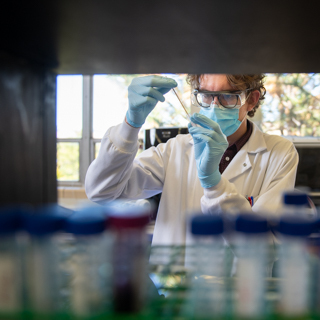People
David Burkhart
Research Professor, Associate Director of the Center for Translational Medicine
Contact
- Office
- HS 309A
- Phone
- 406-361-1672
- David.Burkhart@mso.umt.edu
- Curriculum Vitae
- View/Download CV
Personal Summary
Burkhart Lab Website: https://health.umt.edu/biomed/labs/vaccine-reserach-group/
Dr. David Burkhart received his PhD in Medicinal Chemistry in 2002 from the University of Idaho under the tutelage of Dr. Nick Natale where his research focused on the asymmetric synthesis of (S)-2-amino-3-(3-hydroxy-5-methyl-4-isoxazolyl)-propionic acid (AMPA) neurotransmitter analogues as potential therapeutics for neurodegenerative dysfunction such as Alzheimer's disease. In the summer of 2002 he trekked south to join the laboratory of Dr. Tad Koch at the University of Colorado, as a postdoctoral fellow. At UC Boulder Dr. Burkhart researched the design, synthesis and evaluation of novel targeted anticancer agents for the treatment of metastatic breast cancer. Using enzyme cleavable tether technology, the highly potent cytotoxin doxazolidine was selectively targeted to cancer cells using the cyclic-(N-Me-VRGDf-NH) peptide specific for alphavbeta3 integrin over-expressed on the surface of cancer cells to minimize off-target toxicity to normal tissue. Following a two year stint as a Senior Scientist at the CMO Jubilant Organosys, in Spokane Washington, Dr Burkhart joined the R&D team of Glaxosmithkline in Hamilton, Montana in 2008 to use his expertise in targeted drug delivery to focus on the formulation and nanoparticle delivery of vaccines and immunotherapeutics.
Education
B.S. Chemistry, University of Idaho, (Moscow, 1997)
Ph.D. Organic Chemistry, University of Idaho, (Moscow, 2002)
Post-Doctoral Scientist, University of Colorado (Boulder, 2005)
Research Interests
Vaccine Research and Development
New Adjuvant Discovery
Immunotherapy
Nanoparticle technology
Drug Delivery and Metabolism
Formulation Science
Projects
Vaccine Research: Vaccines have had the greatest impact on human well-being of any medicinal agent in human history. However, the next generation of vaccines is needed to improve safety while maintaining or improving on the effectiveness of current vaccines. We are focused on the use of nanoparticle technology to target adjuvants to specific cells of the immune system in a rational way, that drives the type of immune response needed for a given disease. By tailoring the type of immune response adjuvants produce, we can increase vaccine efficacy, while simultaneously decreasing vaccine side-effects to improve patient safety. Nanoparticles of many compositions, shapes and sizes are capable of co-delivering adjuvants and antigens to sentry like cells of the immune system which enhances the subsequent immune response to that antigen, safely. Our group utilizes liposomes, emulsions, block co-polymers and silica nanoparticles as vaccine delivery tools to probe and enhance their immune response. As such, we also use state of the art analytical tools (HPLC, LC-MS, DLS, EM, Cryo-TEM, SAXS, UV, etc.) to characterize these formulations carefully to understand how formulation characteristics influence vaccine delivery, uptake and processing by immune cells.


Cancer Therapeutics: Our research group focuses on the use of targeted drug delivery of anti-cancer agents to improve efficacy while minimizing off-target drug toxicity for the improvement of patient outcomes. Advances in aptamer and monoclonal antibody technology have revolutionized the field of antibody drug conjugates (ADCs) resulting in the first approved ADCs for the treatment of cancer. Utilizing state-of-the-art linkers between the targeting moiety and the cytotoxin can further improve the safety of ADCs because the linkers are selectively cleaved by enzymes over-expressed by the targeted cancer cells. In addition, our research team uses targeted nanoparticles to develop rapid and safe diagnostics for cancer patients resulting in better early detection for patients and improved solid tumor resection that can save lives by reducing tumor recurrence The use of targeted nanoparticles for the development of advanced diagnostic tools to treat disease.
Active Funding:
Fusion: Vaccine conjugate technology to advance vaccine safety and efficacy (R01AI137146-01A1 Project Dates:7/1/18 – 6/29/23)
TRAC-478: A Synthetic Dual TLR Adjuvant Combination System (HHSN272201800048C Project Dates: 9/30/2018 – 9/29/2023)
Nanoparticle formulations of agonists of the C-type lectin receptor as novel adjuvants for the treatment of bacterial and viral disease (NIH Contract HHSN272201400050C).
Advanced formulations of TLR7/8 agonists in the search for new anti-viral adjuvants (NIH Contract HHSN272200900036C).
Selected Publications
- De Serrano, LO, Burkhart, DJ. Liposomal vaccine formulations as prophylactic agents: design considerations for modern vaccines J Nanobiotechnology 2017, 15:83, PMID: 29149896 PMCID: PMC5693489
- Staats HF, Burkhart, DJ. Vaccine adjuvants: Softness makes it better Nature Materials volume 17, pages 113–114 (2018) doi 10.1038/nmat5072.
- Borriello, F, Pietrasanta, C, Lai, JC, Walsh, LM, Sharma, P, O'Driscoll, DN, Ramirez, J, Brightman, S, Pugni, L, Mosca, F, Burkhart, DJ, Dowling, DJ, Levy, O, Identification and characterization of STING as a robust adjuvant target for early life immunization Front. Immunol., December 12, 2017. doi: 10.3389/fimmu.2017.01772
- Oberoi HS, Yorgensen YM, Morasse A, Evans JT, Burkhart DJ. PEG modified liposomes containing CRX-601 adjuvant in combination with methylglycol chitosan enhance the murine sublingual immune response to influenza vaccination. J Control Release. 2016 Feb 10;223:64-74. PubMed PMID: 26551346; PubMed Central PMCID: PMC4729458.
Affiliations
Biomedical & Pharmaceutical Sciences (BMED)
The Center for Translational Medicine (CTM)
The Center for Environmental Health Sciences (CEHS)
Professional Experience
Postdoctoral Fellow, University of Colorado, (Boulder, 2005)
Senior Scientist, Jubilant Organosys (Spokane, 2006)
Principal Scientist, GlaxoSmithKline (Hamilton, 2008)
Investigator, GlaxoSmithKline (Hamilton, 2013)
Research Professor, University of Montana (Missoula, 2016)
Associate Director, Center for Translational Medicine (2019)

